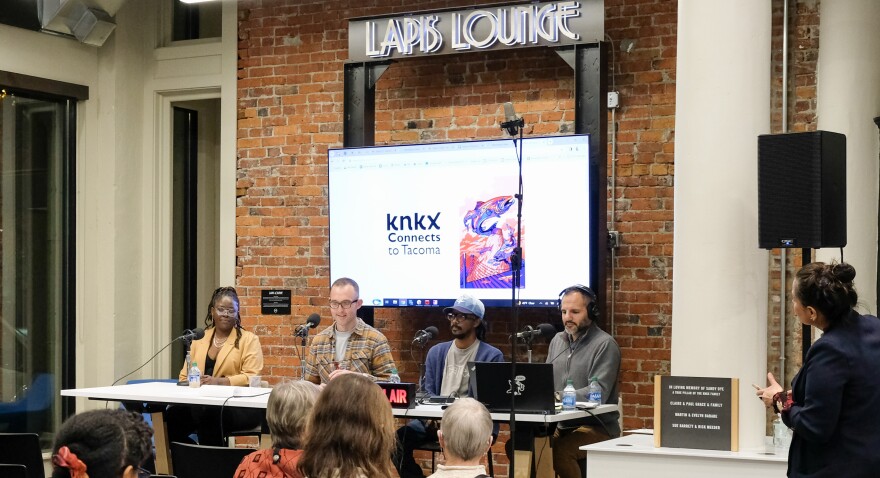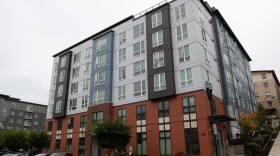This November, we’ve brought you stories from Tacoma as part of our KNKX Connects to Tacoma series. We’ve met some of the newest residents. We’ve explored environmental activism. We visited some neighborhoods and sampled sound, food and its scents.
Tacoma is the third largest city in the state of Washington, with more than 219,000 residents at last count. In the past decade, the city has added nearly 21,000 residents. In a comprehensive plan, the city says it needs to plan for faster growth — a growth of nearly 60% in the next two decades.
To round out this series, we hosted a conversation about the future of Tacoma, featuring three residents who are making their mark on the city.
Filmmaker and community organizer Jamika Scott was recently elected to Tacoma’s City Council. She grew up on the Hilltop and co-founded the Tacoma Action Collective in 2015 to address social justice concerns in the city.
“We say it's a welcoming city,” Scott said when asked why she ran for Tacoma City Council. ”I think that people mean that, but it needs to be modeled. It needs to be put in priority when we're making policies, when we're talking to people at council meetings, when we're engaging people in the community. And also I feel like what we're really missing is the voice of lived experience.”
Matt Driscoll is a columnist for the Tacoma News Tribune. He grew up in Puyallup and through his work at the paper chronicles the issues facing Tacoma, and some of the solutions.
“One of the things that I've always appreciated about Tacoma is it, you know, it's a little bit of kind of an underdog,” Driscoll said. “It's a place that, you know, folks can find a footing in a lot of ways because, you know, no one's paying attention to us anyways”

Business owner Umi Wagoner is a Tacoma native and co-owner of eTc Tacoma, a streetwear boutique retailer in downtown. He explained how he and his business partner Perris came up with the idea for eTc.
“He and I used to take trips to Seattle. And we would go to this store called Goods and there was nothing like it in Tacoma," said Wagoner. "As we got older, there were attempts at it in downtown Tacoma and elsewhere in Tacoma that just didn't work. And so, you know, by the time we made it to young adulthood, we saw that the gap was still there.”
Roundtable Highlights
On who’s being left behind in Tacoma
SCOTT: It just takes a lot of money to survive in Tacoma and it's increasingly easier to become homeless, to become rent-burdened, to end up unemployed or sick with a heavy hospital bill. So that’s a big part of it is just that stress on people. I think, as a product of that stress, a lot of people are feeling disconnected from each other, because we're all kind of in a scarcity mindset where, you know, we're not necessarily looking to connect, because we don't necessarily have the time and the energy to connect.
WAGONER: I don't know about left behind, there's just a lot of displacing. There are people that believe that they would raise their kids Tacoma that aren't. Friends of mine that, even when they have obtained a nice family salary, they don't feel as though the worth is here, right? They don't see the value of something, so then they go elsewhere.
The proximity of them [Tacoma's neighborhoods] being a little closer together, allows there to be this group hug around the idea of Tacoma.Business owner Umi Wagoner
On the biggest changes to Tacoma in recent years
SCOTT: A lot of the things that I love about Tacoma, the people, the culture, the diversity is still here. It's just I guess what's changed is where certain culture is thriving. Where the culture bearers who used to be in certain spaces, whether that's the Hilltop, the South End, the East Side — having been displaced and not really seeing a lot of that reflected in the growth that we're seeing here.
WAGONER: Oh, yeah, a lot. I mean, visually, just a lot of change to the cityscape itself. I drive to and from Seattle a ton. Every time that I drive, there's a new crane or there's a new building.

On the recent News Tribune series on vehicle homelessness
DRISCOLL: What it really turned into was an examination of the increasing number of unhoused folks in our communities and the increasing number of folks who were living in vehicles to get by and the way that our homeless response system really isn't designed to serve them or to take them into consideration. Our system is based to funnel people through shelters with the hopes of housing someday.
On what Tacoma might be able to do that Seattle can’t
WAGONER: It’s easier to feel the group feeling. We have neighborhoods in Tacoma. But somehow, just the proximity of them being a little closer together, allows there to be this group hug around the idea of Tacoma. And I have learned through attempting to do that in Seattle, that it's different, and that the neighborhoods are a little bit more even more in a silo.
DRISCOLL: I think there's a lot of opportunity to kind of learn from what's happened in Seattle. And I just want to be clear, I'm not buying into ‘Seattle's dying’ narrative or any of that baggage. All I'm saying is progressive politics only go so far if you don't kind of do the hard part. I think what you've learned is that it's really easy to say ‘we shouldn't criminalize homelessness’, or we ‘can’t criminalize addiction’ or any of these sort of these things, but it's a lot harder to find the solutions that actually answer those problems.








